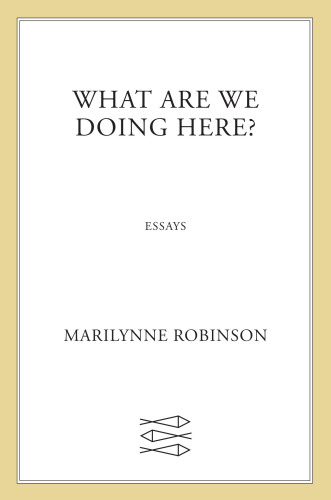
What Are We Doing Here?
Essays
کتاب های مرتبط
- اطلاعات
- نقد و بررسی
- دیدگاه کاربران
نقد و بررسی

November 13, 2017
This collection of 15 essays by Pulitzer-winning author Robinson (The Givenness of Things) is sometimes cranky and rambling, but always passionate. Robinson’s crankiness comes out in her love of Puritans, Calvinists, and Oliver Cromwell, and her annoyance at history’s maligning of them. Yet it also stems from her passion for art and beauty, a humane deity, and a world run more by moral compass than balance sheet. Following Robinson’s train of thought can make for a bumpy and circuitous ride, no doubt in part because most of the essays originated as spoken addresses. Yet with Robinson as guide, details in the cultural terrain emerge that one might otherwise miss. She points out in “The American Scholar Now” that when the U.S. actively funded the humanities, its prosperity simultaneously grew. Elsewhere in the same piece, she notes that “the Citizen has become the Taxpayer” as civic ideals have eroded. In “Slander” she looks with approval at the long Christian tradition of curbing one’s tongue and unequivocally places blame for a now uncivil society on an unhappy convergence of “dystopian media” with right-wing Christianity. An essay or two rambles too much—“Untitled” is aptly named—but Robinson’s overall trajectory is clear and important. Her eloquent work stands up for a compassionate faith, the value of education, and a sense of decency.

December 1, 2017
Winner of the Pulitzer Prize and the National Book Critics Circle Award for her novels, Robinson (The Givenness of Things: Essays, 2015, etc.) gathers trenchant essays about faith, values, and history, most delivered as lectures at religious institutions and universities from 2015 to 2017.Speaking at the University of Virginia, the author told her audience that she discovered, in an article on the internet, a description of herself as personifying "unhipness," a quality that she cheerfully embraces. "I am in my seventies, I was born in Idaho, I live in Iowa, I teach in a public university, and I am a self-professed Calvinist," she admits. Her unhipness, though, was given as a warning that readers "will find thinking that is very unlike their own." This fear of contradictory ideas Robinson finds deeply disturbing: history is filled with "erasures and omissions," she asserts, which skew our understanding of our shared heritage. In several essays, for example, she points to mistaken beliefs about capitalism, American exceptionalism, slavery, and the Puritans. "The convention," she writes, "is that Puritan culture was stunted intellectually, emotionally, and morally by the religious tradition that also founded Harvard and, of course, Yale, to name only local examples of their remarkable institution-building and their devotion to learning." In an essay about freedom of conscience, Robinson characterizes "Early American historiography" as "a toxic compound of cynicism and cliche, so false that it falsifies by implication the history of the Western world." She blames nostalgia for the conviction that America "must once have had the authenticity and fellow feeling supposedly to be derived from a common stock," emphasizing the ethnic and religious diversity that flourished since Colonial times. Robinson is at her most lyrical when writing about Barack Obama, whom she much admires and believes to have been the ideal president for 21st-century America: "dignified, gracious, competent, and humane," showing endurance "more than heroic." The author also writes with rueful anger about the vicious slander that her mother saw on Fox News.Sharp, elegant cultural analysis.
COPYRIGHT(2017) Kirkus Reviews, ALL RIGHTS RESERVED.

January 1, 2018
In one of the most moving pieces in this collection of learned and probing essays recently presented as lectures at such venues as Princeton, Harvard Divinity School, and Westminster Abbey, Robinson (The Givenness of Things, 2015) reflects on her public and philosophical conversation with gracious, good, and brilliant President Obama. Elsewhere, in instructive contrast, this Pulitzer Prize-winning novelist and rigorous and inquisitive scholar of theology and history condemns sloppy habits of mind and divisive assumptions, declaring, We have surrendered thought to ideology. She calls, instead, for loyalty to the truth and makes a reverberating case for renewed support for public universities, libraries, and the humanities, which all profoundly enrich national life. Religious to her core, Robinson finds inspiration in science as the wonders it reveals affirm her awe over the complex matrix of Being. Her receptivity to all of life, ravishingly expressed in Grace and Beauty, underlies her clarion opposition to the Christian right's abandonment of Christian values and propagation of dystopian media. Robinson's gorgeous, demanding, and enlightening essays, propelled by her intricate vision of unity, radiantly recharge both mind and soul.(Reprinted with permission of Booklist, copyright 2018, American Library Association.)

September 15, 2017
Addressing our current political climate, Pulitzer Prize and National Book Critics Circle Award winner Robinson, not unexpectedly, does so by considering how writers such as Emerson and Tocqueville have shaped our political thought, encouraging us to continue their tradition and play a role in "a great theater of heroic generosity, which, despite all, is sometimes palpable still."
Copyright 2017 Library Journal, LLC Used with permission.

























دیدگاه کاربران